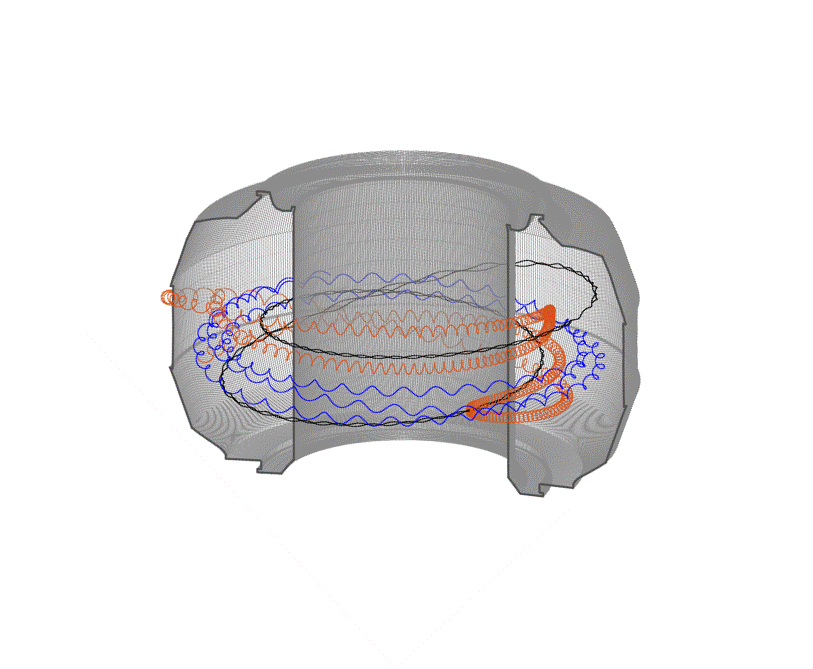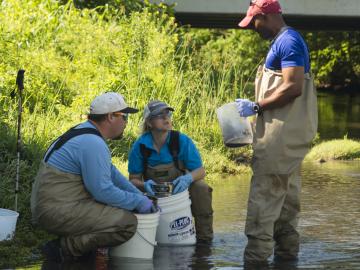
Filter News
Area of Research
- Advanced Manufacturing (2)
- Biology and Environment (15)
- Computational Biology (1)
- Computational Engineering (2)
- Computer Science (5)
- Electricity and Smart Grid (1)
- Energy Science (28)
- Fusion and Fission (2)
- Fusion Energy (5)
- Isotopes (2)
- Materials (11)
- Materials for Computing (3)
- Mathematics (1)
- National Security (2)
- Neutron Science (5)
- Nuclear Science and Technology (11)
- Nuclear Systems Modeling, Simulation and Validation (1)
- Quantum information Science (1)
- Sensors and Controls (1)
- Supercomputing (8)
News Type
News Topics
- (-) Biomedical (11)
- (-) Grid (22)
- (-) ITER (3)
- (-) Machine Learning (14)
- (-) Mercury (3)
- (-) Microscopy (11)
- (-) Nuclear Energy (19)
- (-) Space Exploration (10)
- 3-D Printing/Advanced Manufacturing (34)
- Advanced Reactors (13)
- Artificial Intelligence (16)
- Big Data (17)
- Bioenergy (17)
- Biology (21)
- Biotechnology (4)
- Buildings (21)
- Chemical Sciences (13)
- Clean Water (14)
- Composites (11)
- Computer Science (42)
- Coronavirus (11)
- Critical Materials (12)
- Cybersecurity (3)
- Emergency (1)
- Energy Storage (32)
- Environment (48)
- Exascale Computing (1)
- Fossil Energy (1)
- Frontier (1)
- Fusion (9)
- High-Performance Computing (12)
- Hydropower (6)
- Irradiation (2)
- Isotopes (5)
- Materials (36)
- Materials Science (34)
- Mathematics (3)
- Molten Salt (5)
- Nanotechnology (12)
- National Security (3)
- Neutron Science (27)
- Partnerships (2)
- Physics (4)
- Polymers (10)
- Quantum Computing (5)
- Quantum Science (12)
- Security (1)
- Simulation (9)
- Statistics (1)
- Summit (8)
- Transportation (36)
Media Contacts
![2018-P07635 BL-6 user - Univ of Guelph-6004R_sm[2].jpg 2018-P07635 BL-6 user - Univ of Guelph-6004R_sm[2].jpg](/sites/default/files/styles/list_page_thumbnail/public/2018-P07635%20BL-6%20user%20-%20Univ%20of%20Guelph-6004R_sm%5B2%5D.jpg?itok=hUSyvkP0)
A team of scientists, led by University of Guelph professor John Dutcher, are using neutrons at ORNL’s Spallation Neutron Source to unlock the secrets of natural nanoparticles that could be used to improve medicines.

Scientists from Oak Ridge National Laboratory performed a corrosion test in a neutron radiation field to support the continued development of molten salt reactors.

Oak Ridge National Laboratory scientists have devised a method to control the heating and cooling systems of a large network of buildings for power grid stability—all while ensuring the comfort of occupants.

An Oak Ridge National Laboratory-led team used a scanning transmission electron microscope to selectively position single atoms below a crystal’s surface for the first time.

Biologists from Oak Ridge National Laboratory and the Smithsonian Environmental Research Center have confirmed that microorganisms called methanogens can transform mercury into the neurotoxin methylmercury with varying efficiency across species.

Fusion scientists from Oak Ridge National Laboratory are studying the behavior of high-energy electrons when the plasma that generates nuclear fusion energy suddenly cools during a magnetic disruption. Fusion energy is created when hydrogen isotopes are heated to millions of degrees...

A shield assembly that protects an instrument measuring ion and electron fluxes for a NASA mission to touch the Sun was tested in extreme experimental environments at Oak Ridge National Laboratory—and passed with flying colors. Components aboard Parker Solar Probe, which will endure th...

A novel method developed at Oak Ridge National Laboratory creates supertough renewable plastic with improved manufacturability. Working with polylactic acid, a biobased plastic often used in packaging, textiles, biomedical implants and 3D printing, the research team added tiny amo...

An Oak Ridge National Laboratory study is providing an unprecedented watershed-scale understanding of mercury in soils and sediments. Researchers focused on evaluating mercury and soil properties along the banks of a mercury-contaminated stream in Oak Ridge, Tenn., sampling 145 loca...

Scientists of the Next-Generation Ecosystem Experiments are blogging from the Arctic this summer. Follow their adventures at http://ngee-arctic.blogspot.com/. Participants share troubles and triumphs from the field in entries with headings like "Flying Wild Alaska" and "Hitting the Tundra." "The b...


